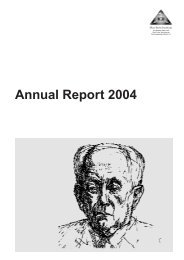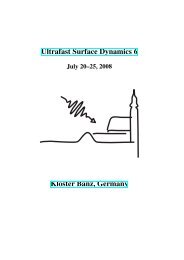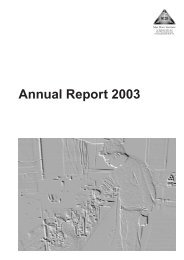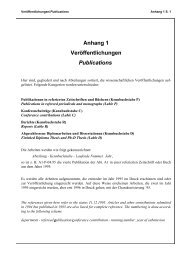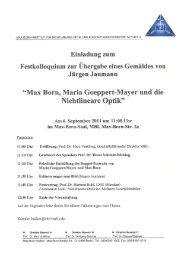Create successful ePaper yourself
Turn your PDF publications into a flip-book with our unique Google optimized e-Paper software.
years I was a Medical Officer in the British Army on War service in the Far East. Throughout<br />
that time my father wrote to me at least once a week, my mother almost as often. I kept all<br />
the letters, and he kept all of mine (as he did with my sisters’) [16]. Re-reading them now,<br />
more than half a century later, brings up a mix of powerful emotions. As an expression of love<br />
and care for his family and myself these letters cannot be surpassed. Although fully aware of<br />
my lack of knowledge of his own science, my father did his best to let me follow his thinking<br />
and to share the pleasures and disappointments of his scientific preoccupations, for example<br />
with his theory of liquids and about what he called reciprocity on which he worked in Edinburgh<br />
in the 1940s and ‘50s. For me the most touching letters is from 1937 [17, 18], when for my<br />
sixteenth birthday he wrote that despite my youth I was his best friend and comrade. That he<br />
meant it is shown by the openness and intimacy of his letters - and of our conversations – right<br />
up to the time of his death in 1970. That such a great man who happened to be my father<br />
gave me his total trust has, as you might expect, had a profound influence in my life.<br />
What comes across from the letters is his strong sense of moral responsibility. This had been<br />
implanted during his childhood in Breslau by his father Gustav [19], Professor of Anatomy at<br />
the University, who up to his early death in 1900 at the age of fifty did original and important<br />
research in experimental embryology. (Most importantly, he discovered the function of the corpus<br />
luteum: Fraenkel,1901.) [20] <strong>Max</strong> wrote about his father: “I am certain that his deepest<br />
conviction was that the most fundamental rules of ethics can just as well or even better be<br />
derived from the study of nature, including man, than from religious tradition. For he believed<br />
that these rules during the course of evolution culminating in human civilisation have become<br />
intrinsic parts of our soul ...” – a persuasive Darwinian argument for the evolutionary origin of<br />
conscience! “He imbued in me a deep respect for the right of every living creature to enjoy its<br />
span in the light of the sun” (<strong>Born</strong>, Brandt and <strong>Born</strong>, 1950). Nancy Greenspan records that one<br />
Fig. 22<br />
Edinburgh Conference on Elementary<br />
Particles in 1949; note<br />
(in the second row, on chairs)<br />
Klaus Fuchs (fourth from the<br />
left) <strong>Max</strong> <strong>Born</strong> and Charles G.<br />
Darwin (ninth and tenth from<br />
the left), Rudolf Peierls (fifth<br />
from the right).<br />
<strong>Max</strong> <strong>Born</strong> • Gustav <strong>Born</strong> 13





